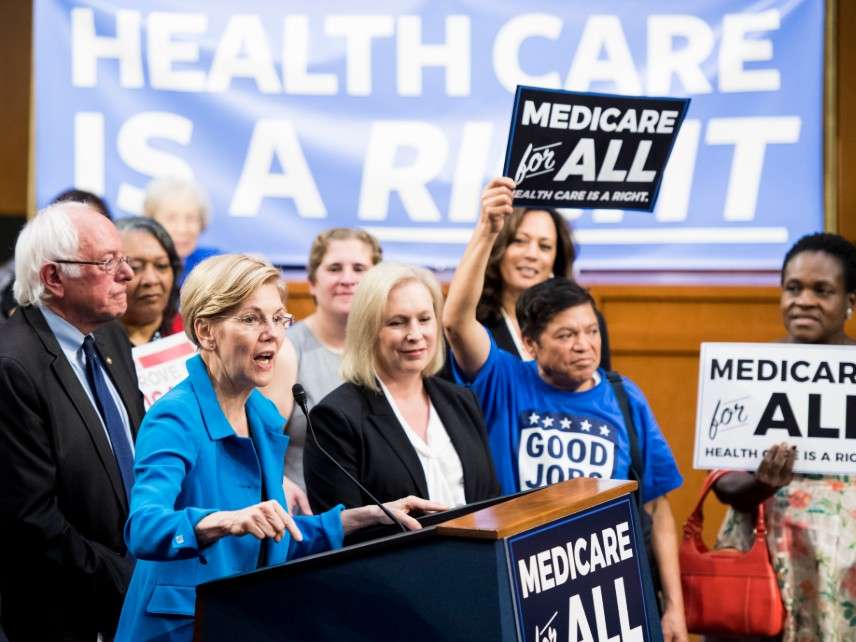Forget Paying for Medicare for All—We Can't Pay for the Medicare We Have
A new report predicts Medicare spending will rise faster than private health care spending.

For the last several years, political conversations about Medicare have revolved mostly around either preserving the program in its current form or expanding it. While campaigning for president as a Republican in 2015 and 2016, Donald Trump repeatedly stated his opposition to any Medicare cuts, and since then has positioned himself as a defender of the federally run health program against the encroachments of "socialism," a rhetorical maneuver that was subsequently adopted by other Republicans.
Democrats, concurrently, have increasingly focused on expanding the program, either by allowing people who are not currently eligible to buy their way in or by using the program (or at least its branding) as the basis for single-payer insurance or something like it. Roughly speaking, Democrats want Medicare for All, while Republicans want Medicare for Those Who Have It Now.
The left side of this debate has been dogged—rightly—by questions of affordability and fiscal soundness. Multiple estimates put the cost of Medicare for All, in the single-payer form envisioned by Sen. Bernie Sanders (I–Vt.), at around $32 trillion. How would a program like this, which even under rosy assumptions would require more than doubling individual and corporate income taxes, be financed?
This is an important question, but for the moment, at least, it remains a hypothetical. This question is not: How are we going to pay for the Medicare program we already have?
This week, Medicare's actuaries released a new report projecting that over the next decade, national health spending will grow 0.8 percent faster than the economy each year, eventually reaching $5.96 trillion. As a result, health spending as a percentage of gross domestic product is set to grow from 17.9 percent last year to 19.4 percent in 2027. Health care spending will then consume nearly a fifth of America's total economy.
That figure accounts for both public and private payers, but the government-run programs are the largest drivers of the growth, with Medicare by far the biggest of the bunch. Over the next decade, Medicare spending is expected to rise by 7.4 percent each year, while spending on Medicaid, the joint federal-state health program for the poor and disabled, is set to rise by 5.5 percent annually. Spending on private health insurance is projected to rise as well—but at 4.7 percent annually, the increase won't be as fast. Increased spending on Medicare (and to a lesser extent Medicaid) is the main factor.
That increase is primarily a result of demographic change as more seniors enter the program. More enrollees means higher costs. But Medicare won't just cover more people. It will increase the average amount it spends on each person—and that increase will be larger than the commensurate increase in private health care spending. Supporters of Medicare for All sometimes argue that although the government cost would be significantly higher, total national health spending would decrease. That only holds under the improbable assumption that health care providers could absorb large reimbursement cuts without service disruption. In any case, these estimates suggest the weakness of attempting to control overall spending growth through Medicare, which is expected to substantially outpace private insurance spending growth.
There are other ways to break down the projected increase: Spending on drugs, hospital visits, and doctor services are expected to rise rapidly over the next 10 years. But Medicare, the nation's largest public payer for health care services, contributes to all of these categories. It is hard to avoid the conclusion that Medicare is the dominant factor in the projected increase in overall spending.
This is not a new phenomenon. Health care spending began its rapid rise as a percentage of the economy around the time that Medicare and Medicaid were introduced. The business and practice of medicine have obviously changed dramatically in the intervening decades; as with any economic transformation, multiple factors are in play. But there has long been a case that, when it comes to rising health spending, Medicare is the primary culprit.
In addition to the program's larger effects on the economy, the program's internal finances are in increasingly dire shape. Last year, the program's trustees projected that its main trust fund (which is itself a kind of accounting fiction) would be depleted in 2026, three years earlier than previously anticipated. The program wouldn't simply stop, but revenues would only be sufficient to cover 91 percent of expenses, a percentage that would decline over the next 15 years. Over the next 75 years, the program faces $37 trillion in unfunded liabilities. Macroeconomic projections are admittedly difficult and prone to mistaken assumptions, but even if the figures aren't precisely right, that provides a sense of the scale of the problem.
Today, Medicare and Medicaid are widely acknowledged as the biggest drivers of the federal government's long-term debt. Broadly speaking, America's biggest fiscal problems are health care spending problems. And America's health care spending problems are largely problems stemming from increasing spending on Medicare.
And those are problems that approximately no one in national politics wants to deal with, or even meaningfully acknowledge. Although national political figures occasionally nod to Medicare's fiscal challenges and their various economic ripple effects, there is now no significant political movement to address them.
I am under no illusion that building such a movement would be easy or immediately popular. Medicare is generally well-liked, which is why Democrats have branded single-payer as Medicare for All. The program so well-liked, in fact, that one of the most effective criticisms of Medicare for All is that it would undermine current Medicare. But independent of whether they are easy or popular, reforms will eventually become necessary. Yet our nation's political class now seems intent on either ignoring the problem or making it worse.


Show Comments (78)